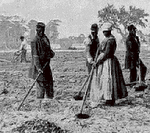Here I sit at my laptop pondering what to write in this week’s blog, flipping through the Douglass text coming to one conclusion- I have no idea what more I could say about slavery. I was not enslaved, I didn’t sit on my grandfather’s knee and hear tales of slavery, I am generally unaffected by the past horrors of slavery. Yes, I’ve read the Douglass text several times, and read other slave stories, but I remain rather indifferent. Is that really true? Can I honestly say that as a white female in twenty-first century America I have not felt something that is essentially the product of early U.S. slavery? I look up at the bulletin board behind my desk and see that this is certainly not the case- my eyes fall upon a Gone With the Wind calendar. While still unsure what to write, I start browsing my pictures on my computer and find the pictures I took while visiting the battlefields of Gettysburg. So now I realize that I have a much greater interest in slavery than I at first thought; I am completely a Civil War buff. The Civil War is definitely linked to slavery.
The Civil War was a violent, crude battle focused on the economic and social differences of the North and South. The North was a center of industry with a majority in the U.S. House of Representatives. This majority factor played a huge role in the economic benefits given to the North, and the harsh circumstances Southerners faced as a result of high tariffs. While the Northern citizens were able to easily import the many luxury goods they enjoyed from Europe to support their lavish and wealthy lifestyles, the Southern plantation suffered. The Southern planter experienced poor crop prices because of the high exporting taxes as well as soils that were exhausted from cotton. The South wanted independence from the North so that they could control the import and export taxes in a way that would support their economy.
The social issue the North and South most conflicted on was of course slavery. The abolitionist movement was spreading, and even many Southerners were pro-abolition yet still supported secession. While the North was criticizing Southern planters for keeping slaves, they acted quite hypocritically. With the industrial boom came a rising demand for cheap labor. Instead of implementing a policy of slavery, the Northern factory owners maintained sweat shops. The working conditions were often as bad or worse than that of the slaves. The coal industry became larger, and these employees suffered health problems as a result from working in the coal mines without proper accommodations for respiratory health. These laborers may have been free, but they were paid meager wages and forced to endure conditions similar to those of slaves. In many cases the employees would actually live on the factory property in rundown shacks that should have been condemned. Yet despite treating men, women, and children like this, the Northerners had “better” morals.
Looking back at the choice to use the Civil War as a means for ending slavery, it should have guaranteed a certain defeat of the South. The Southern economy was already struggling enough without losing their slaves as the Union soldiers came through and freed slaves or convinced them to join the Union forces in rare cases. The loss of the slaves on a plantation meant the loss of any chance of profit for that seasons crops. No war can be fought without funding. The South was set up for defeat from the start because the North had factories already in operation which could be easily changed into factories for artillery. The South, however, did have a good start because of the skills and knowledge of backcountry living as well as the best military school in the country. The Southern generals were some of the best war strategists to ever live, no competition for the incompetent and numerous generals the North went through in the beginning.
The Civil War was fought over economics and morals. The North felt that they were morally right to try to abolish slavery, choosing sweat shops instead. The South felt that the U.S. government was not treating them fairly, preferring to look after the economic well-being of the North instead of the nation as a whole. Each side had a valid reason for fighting for the cause. The Union forces ultimately won, defeating the Southern culture of slave-worked plantations and further damaging the economically handicapped South. What if slavery had not been one of the issues of the Civil War? Would the tide of the war have turned? Would the North have remained as dedicated to maintaining the Union as a whole?
Portrait of Frederick Douglass
Frederick Douglass
A Photo Documentary of Slavery
Showing posts with label Union. Show all posts
Showing posts with label Union. Show all posts
Wednesday, April 4, 2007
Subscribe to:
Posts (Atom)
